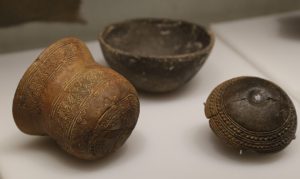Experts investigating ancient DNA samples reveal how ancient Bronze Age people crafting bell-shaped pots, known as the Bell Beaker culture, may have displaced Neolithic farmers.

The bell-shaped beaker vessels have been created all around Europe around 4500 years ago. Archaeologists discussed whether they could have been attributed to one or many different groups of people. The latest study reveals, basing on 170 genome samples of ancient Europeans, that in the Iberian Peninsula and central Europe skeletons found near Bell Beaker artefacts share few genetic ties while in Britain such individuals seem to be a distinct, genetically related group that almost wholly replaced the island’s earlier inhabitants. The team analysed more than 1 million DNA variants across the genomes of individuals who lived in Europe between 4700 and 1200 BC. The study suggests that Britain’s Neolithic farmers were pushed out by new coming Bell Beaker people. The study is also said to be a major work that typifies how huge ancient-DNA studies are disrupting archaeology.

The pots are found across immense, but discontinuous, geographical area from Scandinavia to Morocco. After a few hundred years, the pots vanish from the record. The distinctive pots are considered as ubiquitous but there are regional differences in ceramics and burial style. The analysis seems to dispel the idea of one “Beaker people” arising from a specific source. In Britain, the arrival of Bell Beaker pots coincided with a shift in the island’s genetics. The genome of 19 Beaker individuals across Britain revealed that they shared little similarity with those of 35 Neolithic farmers there. The pot-makers were more closely related to 14 individuals from the Netherlands, and had lighter-coloured skin and eyes than the people they replaced. By 2000 BC, signals of Neolithic ancestry disappear from ancient genomes in Britain. It is calculated that Britain saw a greater than 90% shift in its genetic make-up.
(after Nature, Lanmas & Marc Vander Linden)